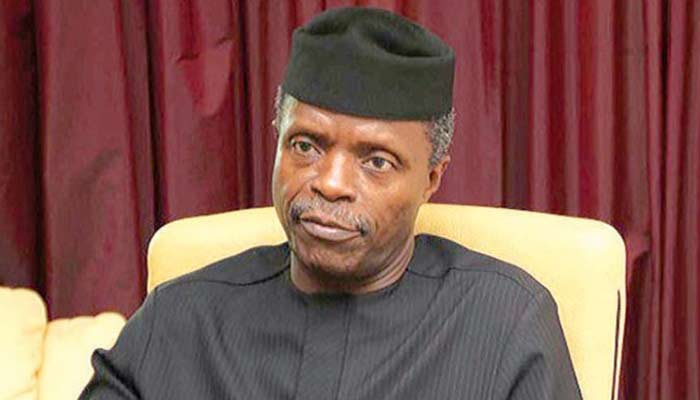Vice President Yemi Osinbajo says the Federal Government has, over the years, deployed significant resources to address challenges in education and healthcare.
He said that the Federal Government was committed toward addressing human capital development and related issues in the country with the same zeal it showed in the implementation of the Social Investment Programmes.
Osinbajo’s spokesman, Laolu Akande, in a statement on Saturday in Abuja, said that the vice president virtually delivered a keynote address at the Rauf Aregbesola Leadership Colloquium 2021.
The colloquium with the theme, “Government and Big Development: Realities and Solutions for Nigeria,’’ was organised to mark the birthday of the Minister of Interior.
Osinbajo harped on the circumstances where governments might need to intervene directly, including in human capital development.
“Direct state government intervention is crucial; you cannot have such conditions such as in the country and not have some direct interventions from government.
“The point is that, for many of the challenges that face a developing economy, there is very little, immediate term profit for private actors in addressing those challenges, but of course, there are huge medium to long term social and economic gains to be reaped.
“In order to fill that gap, government must come in, government must intervene.

“This intervention in my view, are the issues of big development. How do you educate the largest youth population in Africa?
“How do you ensure healthcare for that large number of people, and all of the various issues? These are the big development issues that confront us; and we must be able to find solutions to them,”
The vice president said that the present administration, in its first budget, devoted for N500 billion to our Social Investment Programme.
He said that 500,000 young graduates were engaged in the N-Power programme, and 9.5 million children being fed daily in the school feeding programme just before COVID-19 across 34 states.
“The programme employs well over 135,000 cooks, and over 100,000 small-holder farmers linked to the programme, supplying locally sourced ingredients.
“ At some point, this translated to 594 cattle, 138,000 chickens, 6.8 million eggs, 83 metric tons of fish that are procured, prepared, and distributed every week.
“The higher outcomes for enrollment of pupils in school, retention and performance of students have all been empirically verified.
“There was also the Government Enterprise and Empowerment Programme (GEEP) – TraderMoni, MarketMoni initiatives where micro credits were offered to traders (about 2 million traders in all),” he said.
He explained that the programmes were important because they were in many ways government efforts at directly creating opportunities.
According to him, a country such as Nigeria, clearly requires a social welfare programme.
Osinbajo said that a situation where those who could work and those who had no work and the vulnerable were provided with one way of earning something and provided with opportunities was crucial.
In the health sector, he said that since the inception of the administration, it had done a few other direct social investment-type things aimed at human capital development.
“After the National Health Act was passed in 2014, the Federal Government in 2018 began including the one per cent minimum portion of the Consolidated Revenue Fund – amounting to N55 billion to fund the Basic Health Care Provision Fund (BHCPF).
“The Fund is designed to deliver a guaranteed set of health services to all Nigerians, through the national network of Primary Health Care Centers.”
In education, Osinbajo said that since 2015 , the Federal Government had disbursed more than N170 billion in matching grants to states and the FCT under the Universal Basic Education Programme.
He said that N8 billion had been disbursed in Special Education Grants to States and private providers of Special Education, and N34 billion from the Teachers Professional Development Fund to the 36 states and the FCT.
The vice president added that the interventions were in line with the administration’s commitment of lifting 100 million people out of poverty.
He commended the efforts and the achievements of the former governor of Osun State with his socialist ideology.
“He stands out as a reason why one should at least have some socialist blood while recognising the fundamental role of markets and the public sector,” he said.
Aside the convener, other speakers and special guests at the colloquium moderated by notable broadcaster Mr Boason Omofaye, included the Governor of Kaduna State, Mallam Nasir El-Rufai and the Statistician-General of the Federation, Mr Yemi Kale.
The President of the Nigerian Labour Congress, Mr Ayuba Wabba and the Vice Chairman of the Ibadan School of Government and Public Policy, Prof. Tunji Olaopa, among others also featured.(NAN)